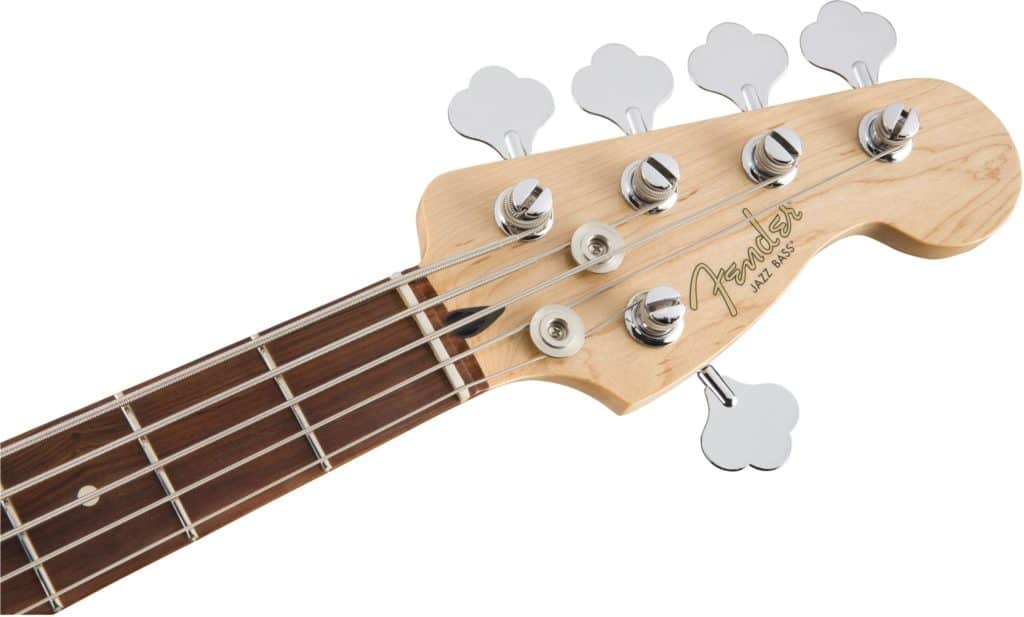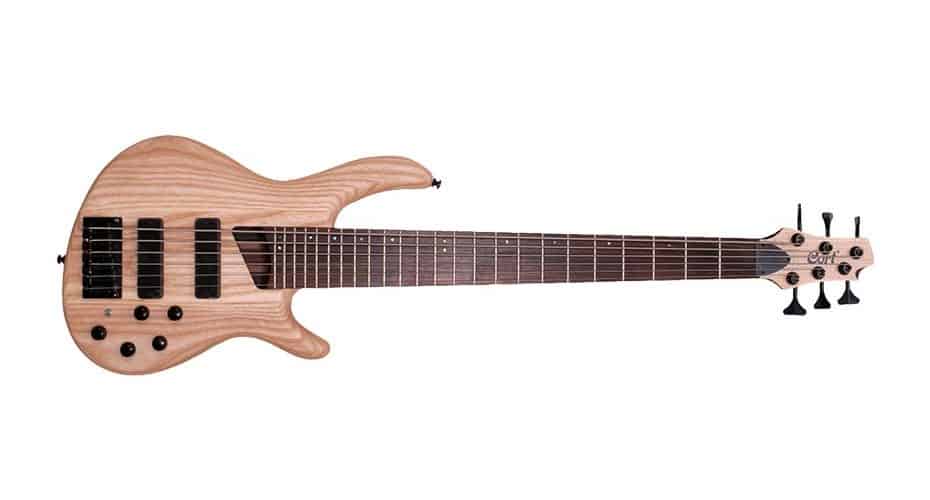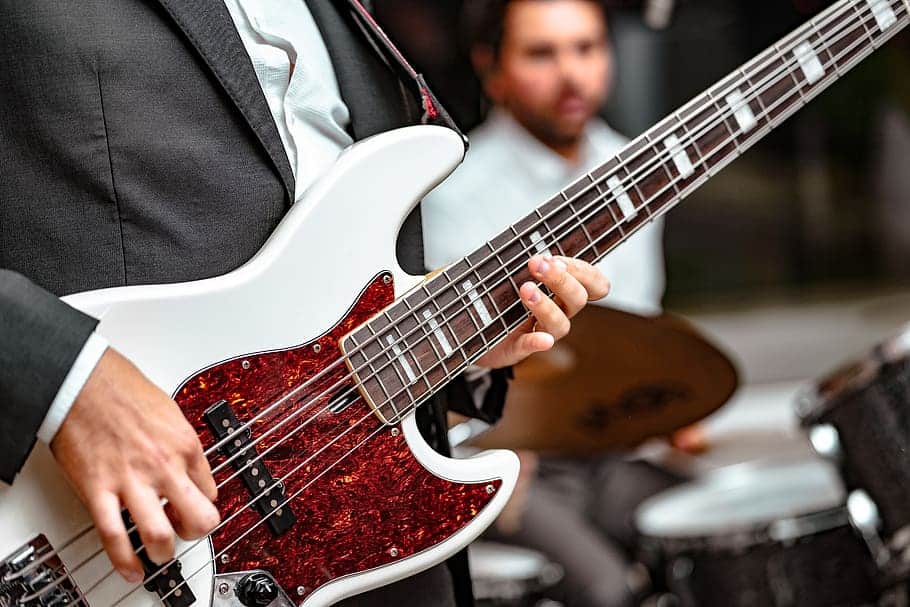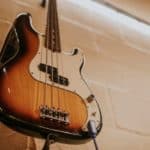Chances are you already have some music experience, and you are looking to expand your toolbox with a bass.
Apart from the many different models and configurations, the fundamental matter of how many strings should you get is a very important hurdle to overcome to better inform your later decision.
As with everything, there will be pros and cons, that you should weigh out before pulling the trigger, and I’m here to illuminate them.
If you want a short answer about what are the differences between 4, 5, and 6 string bass guitars, here it is:
4 string basses are the standard and what 95% of players might ever need. 5 string basses incorporate a lower B string that sounds great and is very usable in the most common tonalities. 6 string basses add a high C string that works great for soloists. The neck will be harder to play as you add strings.
For those who want to stick for a bit longer, in this article, I will dive deeper into this topic.
First of all, I will tell you what’s the reasoning behind adding more strings to the instrument.
After that, we will look at the pros and cons that each of the main string configurations has.
Finally, I will give you my thoughts on the matter and try to recommend what might be best for you.
Are you ready to get started?
Let’s go!
What function do the added strings play?
Adding more strings to a guitar o a bass guitar gives you access to extra notes that wouldn’t be available, at least simultaneously in an instrument with a lower number of strings.
The more strings you get, the wider the range of available pitches at your disposal.
The gain in terms of extra notes is usually 5 semitones, considering you maintain a standard tuning.
Although this number sounds underwhelming, you could do a lot of things with it if you know how to work your way around the instrument.
But, to be fair, you would also be probably doing a whole other bunch of things with fewer notes available anyway, if you really know what you are doing.
Extra strings, of course, are not all gain and no loss. You see, you will be adding complexity alongside them.
From the extra note layouts, you should have to learn, to the thicker neck needed to accommodate them.
A thicker neck would probably be slightly more uncomfortable for players with small hands such as me.
And, oh, of course, the price would likely be higher just because of the extra materials needed adding costs, and because these are considered by some more specialized instruments, and are catered to more advanced players.
But that last thing is not always the rule. I’m generalizing there.
Reasons to go for a 4 string bass

Down to the basics, you would probably not need more than 4 strings. And if you convinced yourself that you do, I’m sorry to break it down this way, but you are probably wrong.
And don’t get mad at me, I suck at bass but still want a 5 string jazz bass. I know it’s a stronger force than rationality that drives us.
There are not that many extra things to do with more strings, and the aforementioned drawbacks might convince you to stay with the traditional configuration.
To recap, with 4 strings you will be just fine 95% of the cases. And you will enjoy having fewer strings to worry about, especially if you are not an advanced player.
4 string necks are thinner, of course, and the instruments are, on average cheaper.
Also, there will be a wider range of models available if you go for the standard number of strings.
Reasons to choose a 5 string bass

A 5 string bass will give you a low B on the open string, or a low A if you use a drop tuning.
To be honest, I find that low behemoth of a pitch absolutely beautiful, and a great home to get to when playing in B minor, for instance.
As long as you don’t overuse this resource, you will be adding some nice colors to your palette.
On the other side, depending on string spacing for the actual model you are after, many players could argue that slapping is easier on a 4 string bass. However, this is by no means a rule of thumb and it will depend on your preference.
Again, as I mentioned earlier, the extra string on one of these bases will require a thicker neck, which might be a pet peeve for some players, but something neutral to many others.
Also, another thing to consider, is that lower pitches are perceived as lower in volume by the human ear, so your added lower range might be more subtle, or even mellower to some.
This, of course, is a matter of perception, and a thing to consider with regard to how your sound would fit on the mix of your music.
In summary, you probably don’t need that extra string, but it is nice to have.
Why pick a 6 string bass

A 6 string bass, on the contrary, will usually give you a high C in standard tuning.
Yes, the 6th string is the thinner and higher one.
With this configuration, you extend the range of notes available on both sides, down to a B on the lower open string, and up to a C on the higher one.
6 string basses are great for those players that are used to solo on the high register of the instrument, and playing chords.
Playing chord melody on a 6 string bass makes a completely different sense.
All of this with the grounding heavy sound of the lower string at hand at every moment.
The drawback of these instruments, as I repeated multiple times, is the thicker neck needed, which at this point starts getting pretty uncomfortable for some, and the added complexity of learning an extra string.
Of course, prices also go up when you get to this amount of strings.
Overall, 6 string basses are great for soloists, prog, and fusion players that like pushing the boundaries of the instrument to the limit, and for those who have understanding bandmates.
At this point, the guitar players on your band might start feeling a bit endangered by your high-pitched lines and chord voicings.
Are more strings harder to play?
More strings are not necessarily harder to play. The mechanics remain the same. However, there will be added complexity, in the form of notes to memorize, and a bit of getting your hand used to where everything lies. The wider neck instruments with extra strings have might also be a drawback for some players.
Conclusion
Choosing the right instrument for you is no easy task, and I consider it a very personal matter that you should decide on your own.
That’s why here in GearAficionado I never point you in a specific direction with no extra considerations.
I think you should get to feel and hear what different kinds of bass guitars have to offer you, and get a sense of how you can adapt your playing to them.
It won’t be a wise choice to get a 6 string beast if you rarely play high lines.
On the other hand, why stick to a 4 string instrument if you really think you could give great use to the low B string?
Be rational, but to a certain amount.
At some point, you should stop overthinking the matter and choose what makes you happier.
Stop worrying about gear and go have some fun.
You deserve it.

Hello there, my name is Ramiro and I’ve been playing guitar for almost 20 years. I’m obsessed with everything gear-related and I thought it might be worth sharing it. From guitars, pedals, amps, and synths to studio gear and production tips, I hope you find what I post here useful, and I’ll try my best to keep it entertaining also.





